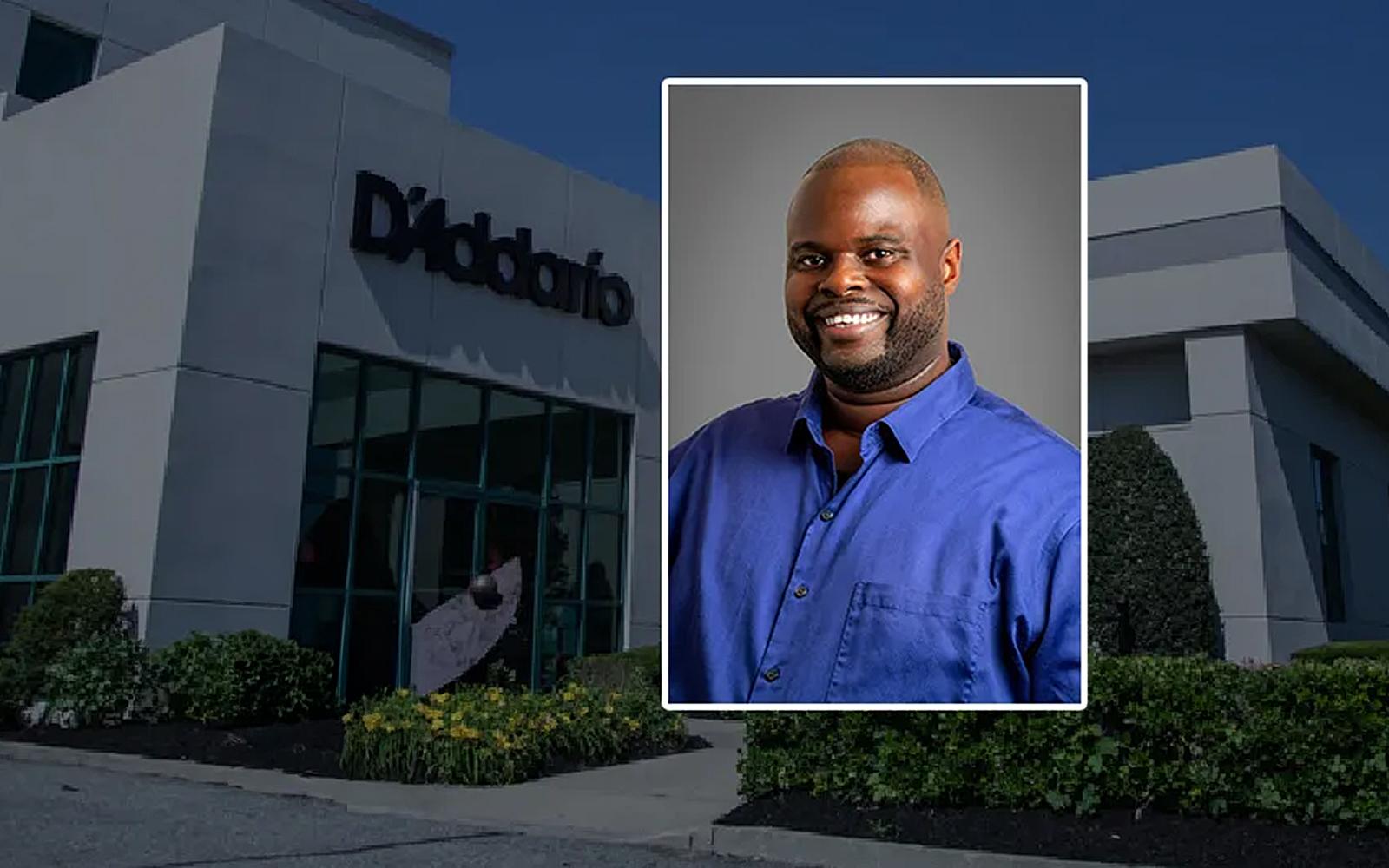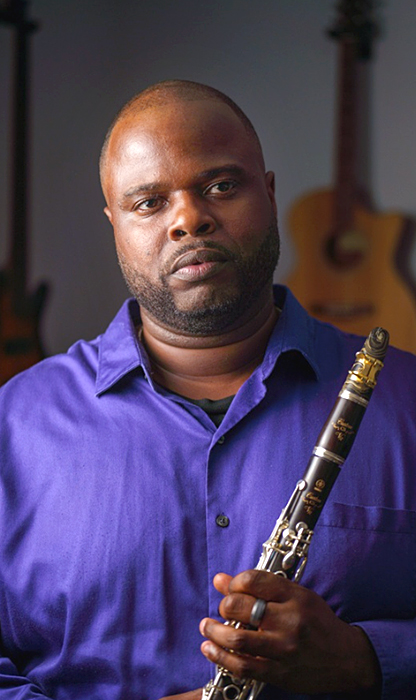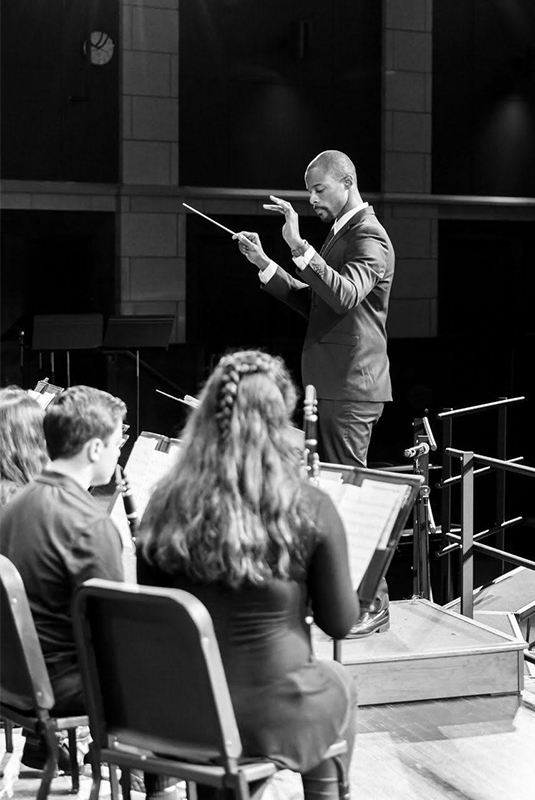A voyage through the soundwaves
Lance '06 and Austin Day '09 shared a brothers’ journey through The Crane School of Music and onto pathways beyond. Often unique and individual in their experiences and perspectives—at other times converging through common foundations, the duo holds touchstones of memory and sound.
Raised hundreds of miles away from the North Country on Long Island, the Day brothers found Crane filtering into their lives, even from early on.

Lance Day '06
Lance is now an Education Market Development Manager for D’Addario & Company, Inc., where he works with music educators and a roster of artists to promote D’Addario’s woodwinds and orchestral products. In this role, he aids new product development, connects musicians with the products they need and manages a team in charge of numerous convention appearances. As the oldest brother and the one who attached to music by age five, he likes to say the family’s musical timeline started with him.
Austin is a teacher at Sleepy Hollow Middle and High School in Tarrytown, N.Y., where he directs the middle and high concert bands, middle school exploratory music, and founded the Music Production and Technology Program. He also serves as director of the middle and high jazz ensembles and two high school jazz combos.
Reflecting on their history in Central Islip, the brothers remember a father who was not a musician but loved music and kept an excellent sound system in the home. Their mother, also not a musician but a teacher, had a beautiful voice and sang all the time—even making up nonsense “theme” songs for both of them.
Music was always in the house, a warm and reassuring tide.
“I knew that music was a core part of my being, even as a kid,” Lance said. “I started playing clarinet in fourth grade, inspired by a girl I had a crush on and was a year ahead of me, promising me she'd teach me how to play.”
That didn’t really work out—but music did, forming greater parts of Lance’s life each year as he progressed into composing, performing original pieces on the clarinet and creating successively larger and more complex works on a series of keyboard workstations. On the way through self-created soundscapes, Lance learned about Crane from an inspirational high school band teacher. At the time, Lance was tutoring elementary students, conducting band rehearsals and working with students on secondary instruments—experiences that prepared him for his studies at Crane.
A few years behind his brother, Austin sank into the notes of the saxophone in middle and high school, where practice became not just an all-consuming passion but a meditation.
“I’d spend every free moment I had in school in the music wing playing or just talking with my directors and the other ‘music kids,’” Austin recalled. “I honestly do not know what lunch in my high school cafeteria looked like, because I never once ate there—I was always in the band room.”
Austin found the thread to the North Country early in life. Three of the music teachers whom he credits with being the most influential in his life were graduates of Crane. SUNY Potsdam was a natural choice following high school, and, with his older brother already enrolled in music education there, entering Crane felt like joining a club where his favorite people were there to welcome him.
“There were so many people and experiences at Crane that had a profound impact on my life,” said Austin, who majored in music education with a minor in jazz. “My studio professors, Tim McAllister and Chris Creviston, shaped my approach to both music and life in ways that, even to this day, I am just beginning to realize and understand. Working with Bret Zvacek and playing with the jazz ensemble, working with Peter McCoy and Marsha Baxter in the Crane Latin Ensemble—those were experiences that shaped who I am as a musician and educator today.”
Like many who try to sum up the weight of their time at Crane, Austin turns to those informal moments and the music school’s indelible sense of community. Among the vignettes: long jam sessions on the commons, longer days in the practice room, couches that gained unforgettable character with time and use, and recording projects with Potsdam’s independent student-run label Madstop Records, then in its infancy.
On giant shoulders
The brothers Day agree—Crane had too many important experiences to name. For Lance, the influence has been categorical.
“On the clarinet side, I was a kid who had never taken private lessons in his life and my professors turned me into a capable clarinetist and helped make the instrument an extension of his soul,” Lance said. “Dr. Michael Schaff and Scott Levine pushed me to play music beyond the page and think of what my part means in isolation and in the context of the ensemble. And they were both so incredibly generous with their time in office hours—we would often just talk about life. They helped to shape my worldview.
“Dr. Peter McCoy and Dr. Marsha Baxter are some of the most brilliant educators I know, and my deep passion for educational philosophy is rooted in our many conversations in Crane and beyond. Dr. David Heinick provided me with my first professional composing opportunity—composing the music for a theater exhibit for The Wild Center in Tupper Lake. And Dr. Greg Wanamaker was not just my composition professor— he was my mentor and the person who truly helped me to convey my essence through music.”
Post-graduation with a bachelor’s degree in music education and composition, Lance wanted to give back. After earning a master of arts in communication and media studies from Syracuse University, he served on the Potsdam Business Administration Advisory Council from 2016 to 2023, in the capacity of chair for the last five of those years, mentoring students along the way. He holds a seat on the National Association of Music Merchants Board of Directors and this year was named one of Music Inc. Magazine’s 5 under 45, an award given to highlight emerging leaders in the music industry. In 2024, he received the National Association of School Music Dealers Inspiration Award for significant contributions to music education and supporting students.
Austin found that Crane’s deep network of faculty, alumni and supporters provided a springboard to his work after graduation. In his senior year, Austin was connected by a Crane faculty member to a graduate program at the University of Northern Colorado, where he landed a job as a managing producer of the UNC Greeley Jazz Festival, the largest educational jazz festival in the country. Austin gained his master of music degree at UNC, then moved on to two years as a performance artist in New York City, facilitated by a Crane recommendation, before finding his true calling in the classroom. In 2024, he was honored with New York State School Music Association Music Education Innovation Award, designed to recognize significant contributors and trailblazing approaches in the music education sphere. He is credited with using deep know-how to design a music program from the ground up and technical knowledge to remove limitations in learning environments while empowering students to own and grow their creativity.
Paying it forward
For those following in their footsteps to Crane, Lance urges students to become specialists and deeply hone their craft. The information age, now turbocharged with AI, means that general knowledge is readily available. But expertise and a unique spin are irreplaceable.
Looking back on what was truly special at Crane, Austin urges newcomers to lean into the rich fabric of the relationships to be found there. Crane, he said, safeguards a strong sense of kinship. With the music world being a small place, graduates will find that many of their connections tie back to the school.
“I can say most of the best moments in both my career and my life can, in some way, be attributed to relationships I’ve formed at Crane,” he reflected.
Austin has been able to witness the fusion of music and learning and see the ripples travel across generations.
“My mother was a retired elementary teacher of 26 years, and she was a first-hand example of how significantly a teacher can impact students’ lives,” he said. “I’ve run into her former students, decades after she taught them—and they’d still approach me to tell me just how much she meant to them. My music teachers in middle and high school profoundly shaped so much of who I am and the decisions that would result in the life I live today.
“To be that person in the life of any one of my students is not a responsibility I take lightly, and I stay motivated to pay it forward in any way I can for the next generation.”
Article by Bret Yager



